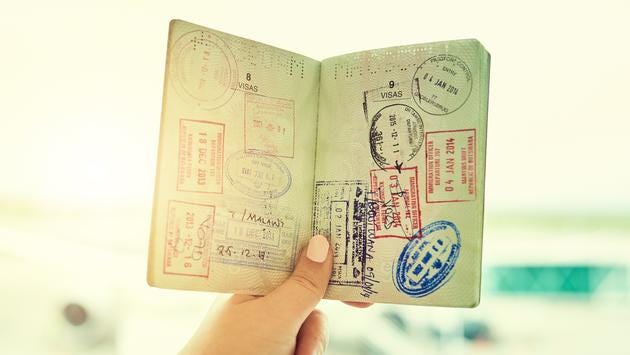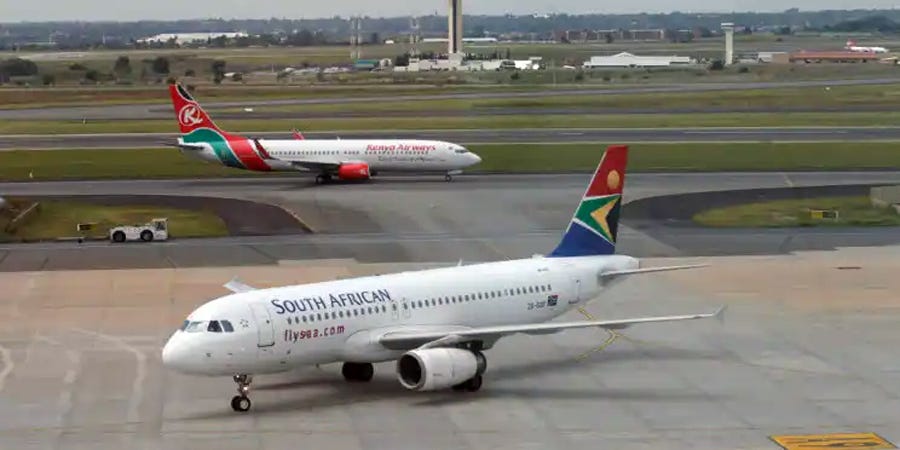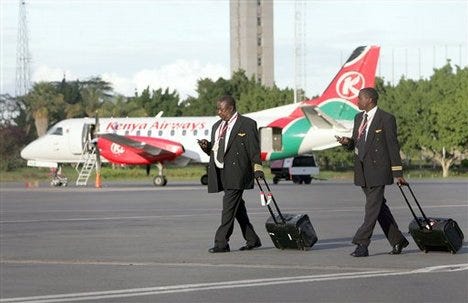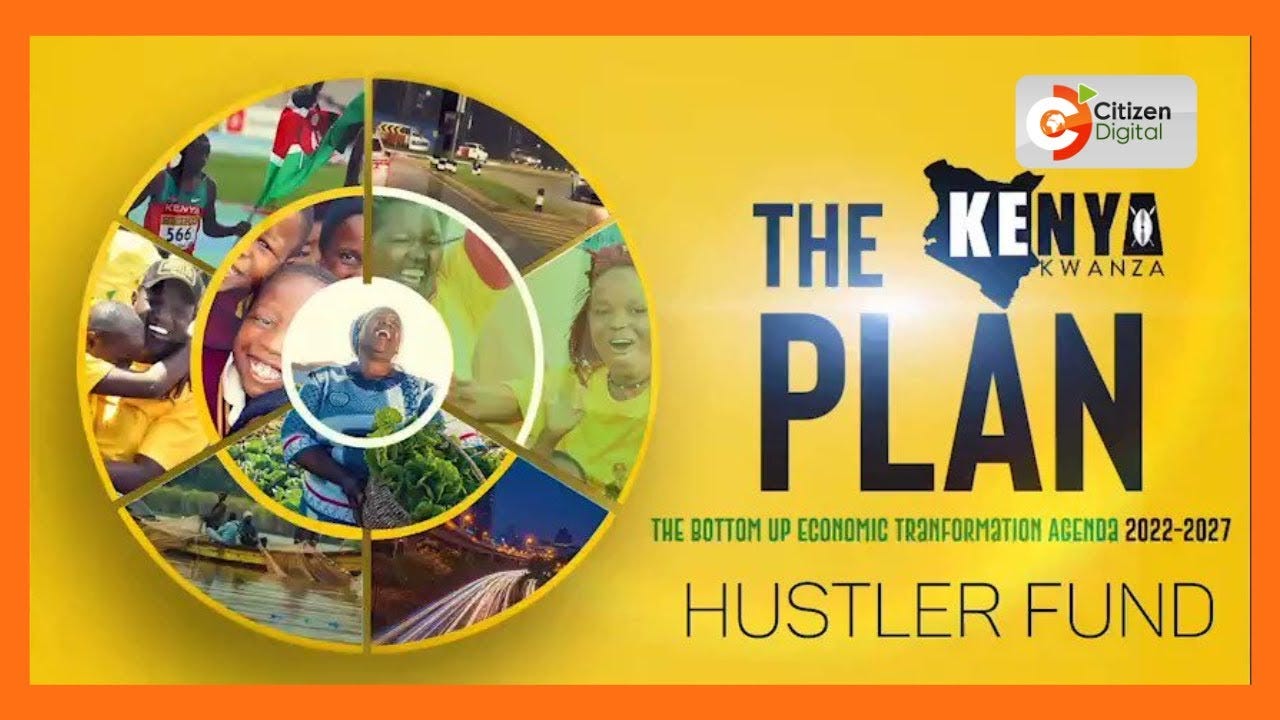Good Morning.
Kenyans to get a yearly 90-day Visa-free stay in South Africa
On Wednesday, Kenyan President William Ruto and South African President Cyril Ramaphosa witnessed an agreement introducing a 90-day visa-free stay for Kenyans in South Africa.
This means that as of next year, Kenyans will no longer need to apply for e-visas or regular visas before traveling to South Africa for business or tourism.
The current visa application process
Kenyans apply for a ‘free’ visa from an agent of the South African High Commission.
The agent charges an ‘application fee’ to handle the paperwork.
The visa often comes out after 4 working days.
The new process
According to the agreement, Kenyans will need the following to qualify for the visa-free stay:
an invitation
a return ticket,
proof of vaccination for yellow fever and Covid-19; and
proof of financial ability to stay in South Africa during the intended duration for tourists
CAPITAL MARKETS
1. Foreign investors at the Nairobi Securities Exchange (NSE) sold off 360 million shares
Foreign investors at the Nairobi Securities Exchange (NSE) cut the number of shares they held by 360 million in the nine months to September, reflecting the flight of capital from emerging economies to the West.
The Capital Markets Authority’s market soundness report for the third quarter shows that foreign individual and institutional investors held 16.84 billion shares at the bourse at the end of September, down from 17.2 billion at the beginning of January.
The effect of the foreign selling has been reflected in the falling valuations of the NSE's largest companies, which include Safaricom, Equity Group, KCB and EABL. 2. October’s Infrastructure Bond was oversubscribed by 53%
Kenya’s recent Ksh 60 billion infrastructure bond was oversubscribed by 53% due to the high-interest rates offered by the Central Bank of Kenya (CBK).
This means the government is going to give a return of 13.9% which is below the 14% average market bid rate.
Kenya Eurobonds are trading at nearly the same rate of 14% due to market volatility caused by rising interest rates globally though the pressure is reducing.
CORPORATE
Kenya Airways and South Africa airlines in consultation to form a Pan-African airline
Kenya Airways and South Africa airlines are in consultation to form a Pan-African airline to rival established players such as Ethiopian Airlines and Emirates.
President William Ruto and South African president Cyril Ramaphosa stated that they were engaging on the matter at a high level that, if successful, would see Kenya Airways and South African Airways form a partnership.
Last year, former President Uhuru Kenyatta and Ramaphosa planned to combine the two airlines’ assets to form an African airline.
Like Kenya airways, SA Airways has been under financial distress made worse by flight bans and the closure of skies due to the Covid-19 pandemic.
Potential Benefits of a pan African airline
It would help both airlines overcome some of the existing market challenges, such as market access restrictions, increased competition from major non-African airlines such as Turkish Airlines, Emirates Airlines, and European carriers.
The alliance could take advantage of a return to pre-COVID travel levels. The International Air Transport Association anticipates a full return to 2019 air traffic levels in late 2023.
It would enable them to create and encourage a market services specialisation among airline operators.
They could pool maintenance services and reduce costs by pooling purchases, sales, and financial transactions. It would boost customer volumes if cost savings were passed on to customers by means of lower fares.
2. Kenya Airways pilots forced back to work
The Kenya Airline Pilots Association (Kalpa) called off their strike notice following a ruling Tuesday by the Employment and Labour Relations Court that ordered the pilots to resume work.
Background of the Polits strike: In Last Week's ConversationStarter
In a statement Tuesday night, Kalpa withdrew their strike notice and urged their members to resume duty on Wednesday, November 9, 2022, at 6 am.
"Members are also urged to report to the Executive Council any incident of victimisation or disciplinary action that may be taken contrary to the court's orders,"- Kalpa
The pilots association stated that they regretted the disruption and inconvenience to Kenya Airwayas guests and urged their members to immediately restore normalcy to operations.
GOVERNMENT
1. Government to cut spending on Non-relevant sectors
The Government of Kenya (GoK) is set to cut spending on non-priority areas in the current financial year in a bid to reduce the country’s fiscal deficit and public debt.
Speaking during the launch of the FY 2023/24 and Medium-Term Budget preparation process, Treasury Cabinet Secretary Njuguna Ndung’u directed all Sector Working Groups to prioritize spending on growth-supporting capital projects.
The move is expected to reduce Government expenditure to about 22.7% of GDP over the Medium-Term, in line with the fiscal consolidation policy.
“The policy’s main objective is to free resources to growth-enhancing programmes by gradually reducing the overall fiscal deficit and the pace of debt accumulation,” - Treasury Cabinet Secretary
2. The Postal Corporation of Kenya (Posta) launched a cross-border business partnership with Tanzania Postal Corporation
The Postal Corporation of Kenya (Posta) launched a cross-border business partnership with the Tanzania Postal Corporation to facilitate ease of doing business and reduce delivery times between the two countries.
The partnership will offer a platform that will ensure fast and efficient delivery of postal and courier services, with the ability to track and trace from origin to destination between the two countries.
It will now take a postal item leaving Dodoma in Tanzania to Nakuru in Kenya, an average of 3 days. Previously, this would take up to 7 days.
3. The Hustler fund
On Friday the National Treasury published draft regulations relevant to the creation of the fund which is set to be launched on 1 December. The regulations and are dubbed the Financial Inclusion Fund regulations.
Highlights of the Financial Inclusion Fund regulations
The loans will be charged under a single-digit interest.
Individuals will be required to be above the age of 18 years and hold a Kenyan identification card to qualify for the loans that will be charged under a single-digit interest.
They should also be members of Micro, Small, and Medium Enterprises (MSMEs), SACCO societies, Chama and table banking groups, or any other registered association
The funds will be administered by a Chief Executive Officer (CEO) who will be obligated to open and operate such bank accounts with the approval of the Board and the National Treasury
The regulations create offences: misappropriation of funds, failure to give information, or falsifying information while applying for the fund which attract a fine of up to Ksh 10 million or an alternative jail term of five years.
INTERNATIONAL MONETARY FUND (IMF)
1. IMF approves loan facility for kenya
Kenya will receive USD 433 million (KES 52.7 billion) from the International Monetary Fund (IMF) as part of the USD2.34 billion(Sh284.8billion) facility approved in April last year.
The agreement is subject to the approval of IMF management and the Executive Board in the coming weeks.
“Upon completion of the Executive Board review, Kenya will have access to USD433 million, bringing the total IMF financial support under these arrangements to US$1,548 million,” - IMF
The funds will assist Kenya in covering external financing needs resulting from drought and challenging global financing conditions.
2. Kenya failed to meet the Ksh 84.6 billion debt repayment obligations to IMF in the year to June
In its latest review of the progress on implementing projects under its 38-month credit scheme, the International Monetary Fund (IMF) stated that Kenya failed to pay 0.7% of the country’s GDP to external creditors.
The IMF did not make public the identity of the creditors.Kenya’s public debt rose to Ksh 8.6 trillion, adding more burden on service costs, with more than Ksh 945 billion used to pay domestic and external lenders in the 2021/22 financial year.
According to data by the CBK, Kenya’s GDP was Ksh 12.0982 trillion by 2021
The IMF stated that factors like huge amounts spent on subsidising fuel, high inflation and disruptions in global supply chains, drained Kenya’s efforts on growing revenue and cutting the budget deficit.
WHAT YOU MUST HAVE MISSED LAST WEEK
APA insurance blacklisted 28 models of cars which would not have access to comprehensive insurance
APA Insurance Company blacklisted 28 models of Toyota, Honda, Maruti, Mazda, Nissan and Suzuki cars, barring their owners from accessing comprehensive insurance covers.
The reason given by APA was that the vehicles were blacklisted because of “wrong usage”Those banned under the insurer’s motor cover include Toyota models (Wish, Vitz, Probox and Fielder) Honda (Stream, Fit, Airwave), Suzuki (Swift), Mazda (Demio, Axela) and Nissan (Tiida, Vanette, Wingroad).
Acorn sold its Qwetu Aberdare Heights I student hostel next to USIU for Sh1.78 billion
Property developer Acorn received Ksh1.78 billion from the sale of a student hostel built near the United States International University-Africa (USIU-Africa) to an income-focused real estate fund.
The Qwetu Aberdare Heights hostel, previously held by Acorn Student Accommodation D-Reit, was transferred to Acorn Student Accommodation I-Reit last month.
The income Reit is not listed but its shares can be traded on the unquoted securities platform of the Nairobi Securities Exchange. The fund is set to acquire more properties to expand its portfolio of income-generating assets.
Tanzania and Uganda have discovered an alternative lucrative market for their maize.
Kenya is staring at another round of food shortage next year as regional countries find an alternative lucrative market for their maize.
Tanzania is selling part of its maize stocks to the Middle East for making animal feeds as demand for livestock meals soar globally while Uganda is trading the commodity to the Democratic Republic of Congo and South Sudan.
Communications Authority of Kenya Published Draft Digital Sound Broadcasting Framework
The Communications Authority of Kenya (CA) called for stakeholder and public views on a draft Digital Sound Broadcasting (DSB) framework it has formulated to ensure the efficient use of the available broadcasting spectrum and encourage investment in the sub-sector.
In the draft proposals published on its website, the Communications Authority states that the DSB network will act as an add-on technology to FM radio and not a replacement. This means that there will be no switch-off date set for the AM or FM radio.
New gold fields in Western Kenya
Shanta Gold, an East Africa-focused gold producer, developer and explorer discovered three more gold fields within the Western Kenya belt, following ongoing exploration efforts.
The three fields; Kimingini, Dhene and Miruka now add to the traditional Isulu and Bushiangala gold fields, raising hope that the firm will strike a commercially viable find whose potential has been estimated to be Ksh 164 billion.









